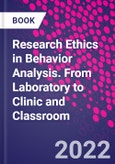The behavior analytic research community emphasizes within-subject research methodologies to study relations between individual behavior and the environment. This is unique as behavior analytic practitioners can then replicate directly the research they read when determining whether a research finding applies to the clients with whom they work. Research Ethics in Behavior Analysis: From Laboratory to Clinic and Classroom is a reference guide for behavior analysts who conduct, supervise, or consume research specific to behavior analysis. This book is sequenced to follow the natural research process, beginning with an introduction to the history of research ethics that led to modern principles and values of scientific research ethics. The reader is taken through sequential steps from obtaining resources to support a research project through participant recruitment, conducting the study, communicating results, and supporting replication. Each chapter incorporates critical and under-discussed topics unique to research ethics in behavior analysis such as diversity, equity, and inclusion in the research process; balancing methodological rigor with clinical outcomes; aligning research and clinical goals; assessing generalization of research findings; the gray lines of assent and consent for intervention versus research; identifying and obtaining resources to support research; conflicts of interest; using technology and social media; and ethically handling data.
Please Note: This is an On Demand product, delivery may take up to 11 working days after payment has been received.
Table of Contents
- From Fuller to Fawcett: A Human Rights History of Research Ethics in Behavior Analysis
- Ethical Principles and Values Guiding Modern Scientific Research
- Equity, Diversity, Inclusion, and Accessibility in Research
- On Staying Open: Thoughts on the Ethics of Seeking Funding for Basic Behavioral Research
- Obtaining Resources to Support Research in Applied Clinical Settings
- Subject Recruitment, Consent, and Assent
- Ethical Considerations with Balancing Clinical Effectiveness with Research Design
- Conducting Research in Applied Settings: Aligning Research and Applied Goals
- Data Handling: Ethical Principles, Guidelines, and Recommended Practices
- Ethically Communicating Research Findings
- Supporting the Replication of Your Research








